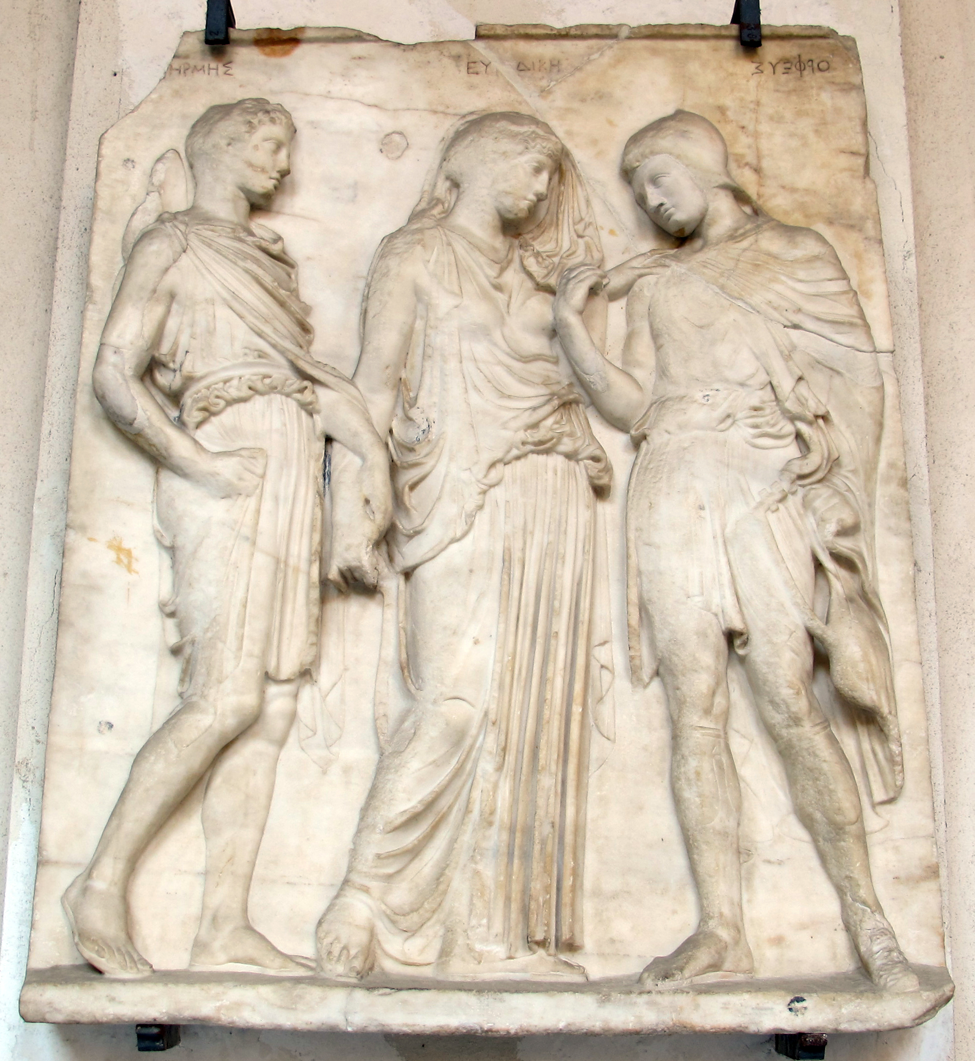Orpheus

Orpheus, said to be the son of Apollo and Calliope, lived in Thrace in Northwest Greece, and was the best lyre player in the world. Some say that Apollo was the one who taught him to play. Orpheus played and sang so beautifully that he enchanted everyone who heard him. Even animals stopped to listen to him, and stones and trees moved closer to hear him sing.
Orpheus fell in love with a beautiful nymph (or nature spirit) named Eurydice, and he won her heart by his singing. They were married in an open-air ceremony on a hillside. In the late afternoon after the wedding, a former admirer of Eurydice’s began to pursue her. She became frightened and ran away without looking where she was going. In her fright, she stepped on a snake, which bit her. The snake turned out to be poisonous, and Eurydice died almost immediately.
Orpheus grieved constantly for Eurydice. He would sit and sing songs of mourning all day every day and weep as he sang. The animals and even the trees and grasses tried to comfort him, but it was no use. Every reason for living seemed to have gone away when Eurydice died. At last Orpheus decided to go into Hades and try to find her.
Orpheus found the cave that led to Hades and slowly descended into the Underworld. He sang to Cerberus and charmed him until the three-headed dog allowed him to enter. Orpheus played for Hades and Persephone and sang them a song about the beginning of the world and the origin of gods and men. Then he sang about the joys of love and the sadness that comes with love’s loss. Orpheus’ singing charmed even the hearts of Hades and Persephone, rulers of the dead. They allowed him to bring his dear Eurydice back to life on one condition: he could not turn back and look at her until they reached the upper world.
Orpheus agreed and turned to go, hoping that Eurydice was following him. But the journey to the upper world was long and difficult, and Orpheus desperately longed to see if Eurydice was really behind him. Orpheus resisted this impulse until the opening of the cave was in sight, just ahead; then he could no longer resist. Orpheus turned back, just for an instant, to see if Eurydice was really there. But that instant was his undoing. As he looked back, he saw Hermes leading her back down to Hades, even as she stretched out her arms to him in her heart-aching sorrow.
Orpheus was inconsolable over his loss of Eurydice for the second and final time. He sang constantly of his love for her and refused to look at any other women. Also, he became a devoted worshipper of Apollo, the sun god. It was his custom to go up to the top of a mountain every morning in order to greet the sun. This made Dionysus very angry. Dionysus was at that time winning the region of Thrace over to his own worship, and he was celebrated at night with frenzied music and dancing. Dionysus resented Orpheus and began to complain to his Maenads about Orpheus’ neglect. The Maenads already hated Orpheus because he refused their advances, so one day, in a Dionysiac frenzy, they attacked Orpheus and tore him limb from limb.
The Muses gathered up some parts of his body and buried them, but Orpheus’ head and his lyre fell into the River Hebros. From there they floated to the island of Lesbos, off the coast of Asia, the head still singing as it went. The Lesbians took the head and the lyre and treated them with great respect. They dedicated the lyre to Apollo, and it was kept for many years in Apollo’s temple there. Some say that the Lesbians buried Orpheus’ head nearby; others say that they kept it, too, in Apollo’s temple, where it not only continued to sing, but also gave oracles and prophesied the future.
After many years a religion grew up, said to have been inspired by Orpheus. Orphic religion told of a life after death. It hinted that the soul did not die with the body, but went on a journey to another world. Those who had lived good lives and had purified themselves of all evil lived permanently in a beautiful place, sometimes called the Elysian Fields. There the sun always shone and the souls enjoyed an ageless and deathless existence. Those who had lived sinful lives remained in Hades, suffering dreadful tortures. Those whose lives had been partly good and partly evil were given a glimpse of the Elysian Fields, but were forced to be reincarnated into new bodies and return to this life once more.

